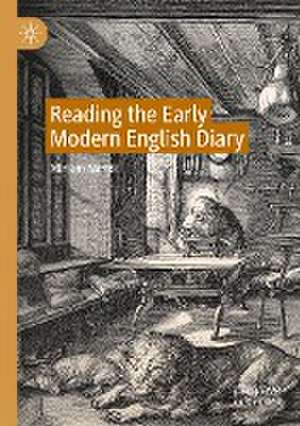Reading the Early Modern English Diary
Autor Miriam Nandien Limba Engleză Paperback – mar 2022
Reading the Early Modern Diary traces the historical genealogy, formal characteristics, and shifting cultural uses of the early modern English diary. It explores the possibilities and limitations the genre held for the self-expression of a writer at a time which considerably pre-dated the Romantic cult of the individual self. The book analyzes the connections between genre and self-articulation: How could the diary come to be associated with emotional self-expression given the tedium and repetitiveness of its early seventeenth-century ancestors? How did what were once mere lists of daily events evolve into narrative representations of inner emotions? What did it mean to write on a daily basis, when the proper use of time was a heavily contested issue? Reading the Early Modern Diary addresses these questions and develops new theoretical frameworks for discussing interiority and affect in early modern autobiographical texts.
| Toate formatele și edițiile | Preț | Express |
|---|---|---|
| Paperback (1) | 691.76 lei 6-8 săpt. | |
| Springer International Publishing – mar 2022 | 691.76 lei 6-8 săpt. | |
| Hardback (1) | 696.18 lei 6-8 săpt. | |
| Springer International Publishing – 28 feb 2021 | 696.18 lei 6-8 săpt. |
Preț: 691.76 lei
Preț vechi: 813.83 lei
-15% Nou
Puncte Express: 1038
Preț estimativ în valută:
132.36€ • 138.57$ • 109.53£
132.36€ • 138.57$ • 109.53£
Carte tipărită la comandă
Livrare economică 07-21 aprilie
Preluare comenzi: 021 569.72.76
Specificații
ISBN-13: 9783030423292
ISBN-10: 3030423298
Ilustrații: VII, 197 p.
Dimensiuni: 148 x 210 mm
Greutate: 0.28 kg
Ediția:1st ed. 2021
Editura: Springer International Publishing
Colecția Palgrave Macmillan
Locul publicării:Cham, Switzerland
ISBN-10: 3030423298
Ilustrații: VII, 197 p.
Dimensiuni: 148 x 210 mm
Greutate: 0.28 kg
Ediția:1st ed. 2021
Editura: Springer International Publishing
Colecția Palgrave Macmillan
Locul publicării:Cham, Switzerland
Cuprins
1 Introduction.- 2 Defining the Diary.- 3 The Diary as Cultural Practice.- 4 Creating Pious Identity: Margaret Hoby’s Reformist Diary.- 5 Anne Clifford’s “Activist” Diaries.- 6 “My Own Hearte out of Frame”: Emotions, Relations, and Religion in Ralph Josselin’s Diary.- 7 Enjoying the Diary: Samuel Pepys and the Transitions of Diary-Writing.- 8 Coda.
Recenzii
“Miriam Nandi’s Reading the Early Modern English Diary offers an interesting psychoanalytic and historical reading of early modern English diaries by Margaret Hoby, Anne Clifford, Ralph Josselin, and Samuel Pepys. … This is still a rewarding study, though. Nandi’s book is written in a crisp, interesting style, often with felicitous distinctions, and with clear argumentation throughout. … Nandi illuminates the early modern diary, and her analytical work is richly suggestive and worth the reading.” (Elizabeth Hodgson, Renaissance Quarterly, Vol. 75 (4), 2022)
Notă biografică
Miriam Nandi is Professor of English Literature at the University of Leipzig, Germany. Her research interests include literary theory, early modern autobiographical writing, and postcolonial literature. She is the author of M/Other India/s (2007) and Gayatri Chakravorty Spivak (2009) and has co-edited Idleness, Indolence and Leisure in English Literature, with Monika Fludernik (2014) and MatteReality: Historical Trajectories and Conceptual Futures in Material Culture Studies, with Ingrid Gessner and Juliane Schwarz-Bierschenk, (2019). Recent publications include work on cultural memory studies and early modern diaries.
Textul de pe ultima copertă
Reading the Early Modern Diary traces the historical genealogy, formal characteristics, and shifting cultural uses of the early modern English diary. It explores the possibilities and limitations the genre held for the self-expression of a writer at a time which considerably pre-dated the Romantic cult of the individual self. The book analyzes the connections between genre and self-articulation: How could the diary come to be associated with emotional self-expression given the tedium and repetitiveness of its early seventeenth-century ancestors? How did what were once mere lists of daily events evolve into narrative representations of inner emotions? What did it mean to write on a daily basis, when the proper use of time was a heavily contested issue? Reading the Early Modern Diary addresses these questions and develops new theoretical frameworks for discussing interiority and affect in early modern autobiographical texts.
Caracteristici
Combines formalist, genre-oriented analyses with historically-informed psychoanalytic models to develop new approaches in diary criticism Sheds light on a range of questions in early modern studies, from writing practices to practical theology, to women’s writing and the construction of selfhood or inwardness Analyses the “narrative identity” that is constructed in diaries from new angles that address the fragmented character of the texts into account
